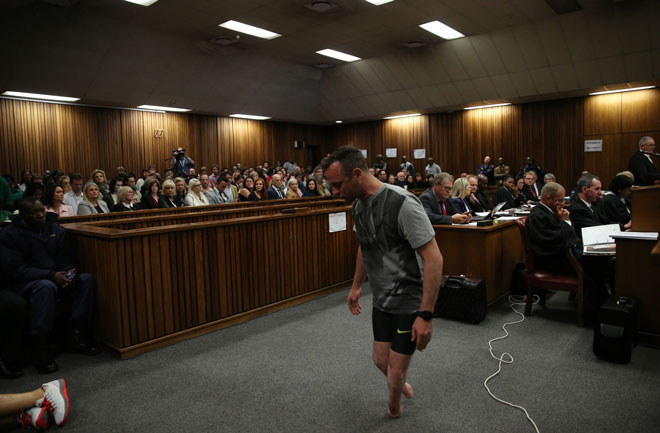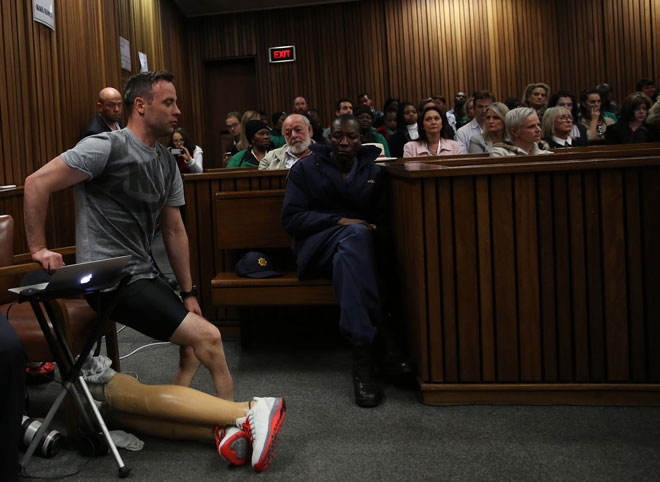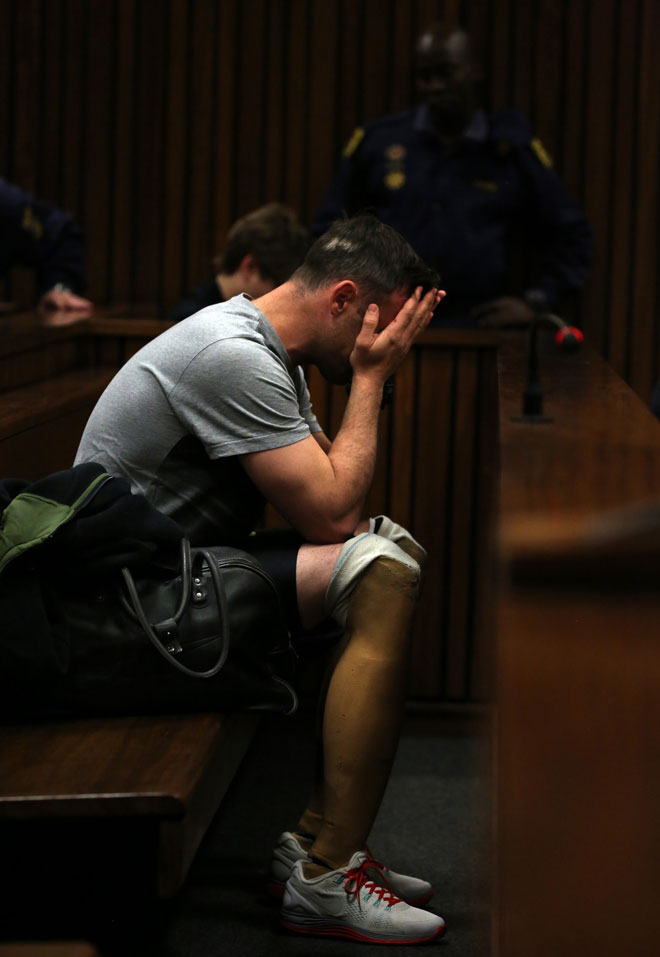- City Fajr Shuruq Duhr Asr Magrib Isha
- Dubai 04:32 05:49 12:21 15:48 18:47 20:04

Paralympic gold medalist Oscar Pistorius prepares to walk across the courtroom without his prosthetic legs during the third day of his hearing at the Pretoria High Court for sentencing procedures in his murder trial in Pretoria on June 15, 2016. (AFP)
A sobbing Oscar Pistorius on Wednesday hobbled on his stumps across a courtroom to demonstrate his physical vulnerability to a judge who will decide next month how long he goes to prison for murder.
The double-amputee removed his prosthetic limbs at the request of his lawyer Barry Roux who is pleading for leniency, but state prosecutors sought a minimum 15-year jail term for the killing of Reeva Steenkamp.
Wearing shorts, the Paralympic athlete held onto wooden benches for support as he walked unsteadily through the courtroom. He appeared in distress as a cushion was provided for him to rest on.
His murder sentence will be handed down on July 6, judge Thokozile Masipa told the High Court in Pretoria after a three-day hearing.
Not intentional
Pistorius has always said he mistook Steenkamp for an intruder when he fired four shots through a locked toilet door in his Pretoria home, killing her almost instantly.
During his closing arguments, defence lawyer Barry Roux asked the gold medalist, known as the 'Blade Runner' for his carbon-fibre prosthetics, to walk on his stumps to show the difficulty he faced dealing with the threat of an intruder.
The lower part of his legs were amputated when he was a baby.
His body shaking with emotion, Pistorius removed his prosthetics and stood on his stumps for about five minutes in front of the court television camera, wiping away tears with a tissue.
"The accused was vulnerable because of his disability," Roux said. "His failure to conduct a rational thought process does not negate his vulnerability."
The defence says Pistorius did not deliberately kill model and law graduate Steenkamp and was "a broken man", calling for a non-custodial sentence that includes community service.
A state prosecutor argued that Pistorius - who did not take the stand himself - had shown no remorse or told the court why he fired the shots, and asked the court jail the athlete for the prescribed minimum sentence of 15-years.
The athlete originally received a five-year sentence for a manslaughter conviction, that was upgraded to murder on appeal. The original trial judge, Thokozile Masipa, was presiding at the hearings at the Pretoria High Court.
FIERCE DEBATE
Roux asked the judge to consider that his client was vulnerable because of his disability and that the prescribed 15-year minimum sentence should give the court "unease".
"The fact is that a disabled person in jail has a more difficult time," Roux said.
The case has prompted a fierce debate in a country beset by high levels of violent crime against women and still dealing with the legacy of decades of apartheid race-based rule.
Some rights groups have said Pistorius, a wealthy white man, has received preferential treatment.
Pistorius reached the pinnacle of his fame in London 2012 when he became the first double amputee to run in the Olympics, reaching the 400 meters semi-finals, before taking two golds in the Paralympics.
Roux said the publicity surrounding the case led to it being portrayed as an incident of gender-based violence, despite the facts showing it was not. Pistorius had now "become the face of gender violence", he said.
Shortly after Roux asked Pistorius to walk without his prosthetics, prosecutor Gerrie Nel requested that the judge allow photos to be shown of Steenkamp's bloodied head and torso.
Masipa ruled that the photos be made available to the public upon request. She said the photos had been banned to protect the Steenkamp family, who had now agreed to lifting the ban.
The victim's father Barry Steenkamp said on Tuesday that Pistorius must pay for his crime.
Prosecutor Nel said Pistorius had failed to show remorse.
"There's a chasm between regret and remorse," Nel said. "Real remorse would have been the accused taking the court into his confidence, telling the court why I fired that shot, why I did what I did. We don't have that."
Johannesburg-based criminal law attorney Zola Majavu said the judge could only deviate from handing out the minimum sentence if Pistorius had demonstrated exceptional circumstances to warrant such a deviation.
He said Pistorius' decision not to speak in court could prove central: "It was a perfect opportunity to show the court that he does take responsibility for his actions."
Pistorius has given an interview to British television, which will be aired next week.
LENIENCY
Oscar Pistorius removed his prosthetic legs in court as part of his defence team's argument that the double-amputee athlete deserves leniency when he is sentenced.
The athlete, who is facing 15 years in prison for killing his girlfriend Reeva Steenkamp in 2013, cried and blew his nose as he hobbled in front of Judge Thokozile Masipa in Pretoria.

AFP
Known as the Blade Runner, Pistorius looked humiliated when he was asked to remove his prosthetic limbs to expose his stumps to the televised hearing which will decide his murder sentence.
There was an awkward moment when Barry Steenkamp was forced to stand to make way for his daughter's killer as he left the dock for the dramatic demonstration.
His T-shirt wet with sweat and his red eyes filled with tears, Pistorius paused at the side of the court to remove his prosthetic limbs in the full view of the packed court.

AFP
The spectacle of the one-time sporting superstar tottering across the court room prompted a number of family members, fans and members of the public to break down in tears.
Loud sobs echoed around the wood-pannelled room as all eyes watched Pistorius move unsteadily, and much dramatically reduced in height, towards the front of the court.
As he struggled to stand still in front of the judge, and in the glare of live television coverage, a cameraman had to step forward to support him.

AFP
His therapist leapt to his aid, guiding him towards the front bench of the court which he clutched to maintain his balance.
Pistorius, 29, appeared so humiliated by the demonstration that he could only stare at the floor, tears flooding down his cheeks, as his lawyer told the court how he did not wish 'to hide behind his fame'.
When the strain of tottering became too much, he knelt down on a cushion before wiping his eyes with a tissue passed to him by one of his legal team.
Pistorius's sister Aimee, and his close friend Jenna Edkins, wiped tears from their eyes at the excruciating demonstration of the athlete's vulnerability.
Steenkamp's father broke down in court on Tuesday as he said Pistorius must "pay for his crime" of shooting his daughter three years ago.
It was the first time that 73-year-old Barry Steenkamp had testified in court and directly addressed the double-amputee Olympic sprinter.
Pistorius killed Reeva Steenkamp in the early hours of Valentine's Day in 2013, saying he mistook her for a burglar when he fired four times through the door of his bedroom toilet.
In March, Pistorius's lawyers lost an appeal judgement that upgraded his original conviction from culpable homicide - the equivalent of manslaughter - to murder.
"It has been very difficult for me to forgive... I feel that Oscar has to pay for what he did. He has to pay for his crime," Barry Steenkamp said, tears streaming down his face.
Reliving how his daughter, 29, died, Steenkamp said: "What she must have gone through in those split seconds - she must have been in so much fear and pain."
Pistorius held his head in his hands and sobbed during the testimony on Tuesday in the High Court in Pretoria, the South African capital.
Grieving mother
Barry Steenkamp, a former racehorse trainer, also described the chaos and panic when his wife June rang him at work early in the morning after Reeva, a model and law graduate, was shot.
"June grieves like I do, all the time. I hear her at night, I hear her crying, I hear her talking to Reeva," he added, saying that June had tried to forgive Pistorius to help her cope with the loss of her daughter.
The identity of the final state witness to appear on Wednesday was not known.
The original trial judge Thokozile Masipa is due to hand down a new sentence for murder after arguments from both prosecution and defence are completed by the end of Wednesday.
Thursday is a national holiday in South Africa, and the sentence could be given on Friday - with Pistorius facing an immediate return to jail.
The minimum jail term for murder is 15 years, but his sentence may be reduced due to time already spent in prison and mitigating factors, including his disability.
![]() Follow Emirates 24|7 on Google News.
Follow Emirates 24|7 on Google News.